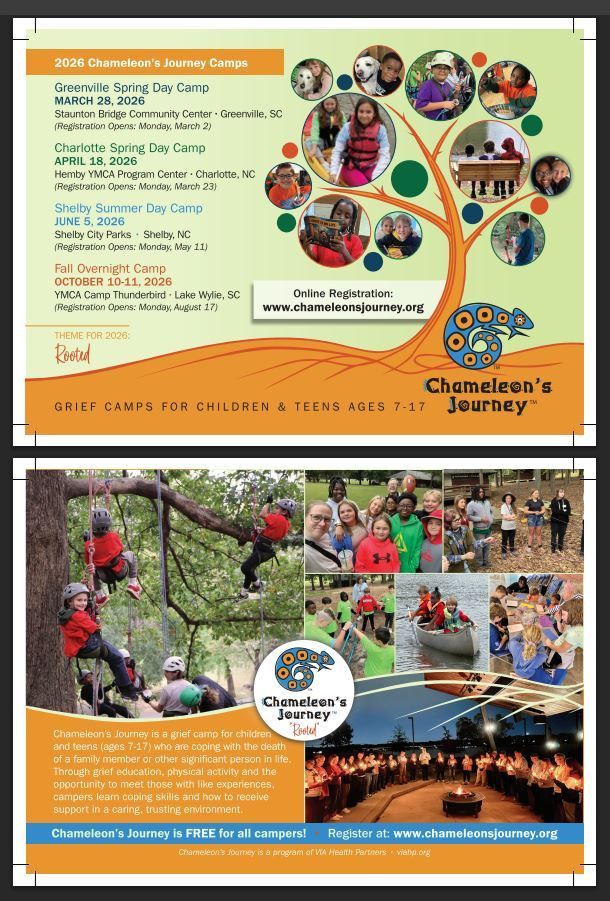Youth & Grief
Children & Grief
Death is a natural event. Experts agree that children, even the very young, should not be shielded from the death of a loved one. Children have the capacity to recognize death as an event and the curiosity to ask questions about the event. The general advice is to talk to the child simply and truthfully about the death, in an age-appropriate manner.
Ages 2 to 7
Up to 7 years of age, children see death mainly as a separation event. This may cause them to feel abandoned and scared. They may fear being alone, and may not want to sleep alone at night, or go to school.
Because children this young are usually not skilled at verbally expressing their feelings, they may “act out” instead, through behaviors such as temper tantrums, refusing to obey adults, or creating an imaginary life, accompanied by role-playing. Other behaviors, usually manifested by children between the ages of 2 and 5, may include eating, sleeping, toileting, or bed-wetting problems. Very young children under the age of 2 may suddenly refuse to talk, and become more irritable in general.
Ages 7 to 12
Children in this age group have begun to understand death as a permanent event. They may regard death as a more personal threat to their individual safety, develop a fear of dying themselves, or resort to “preventive” behaviors to “protect” themselves from death, such as aligning themselves with someone they think can protect them, or focusing on being “brave” or being “good”. Others may simply withdraw socially and/or emotionally from others.
Symptoms may include problems concentrating on schoolwork, trouble following directions, and difficulty in performing daily tasks.
Teens
While teenagers understand and perceive death in closely the same way as adults, they may express their grief differently. They may react in more dramatic ways, or adopt reckless behaviors in an attempt to “defy” death. Reckless driving, smoking, drinking alcohol, taking illegal drugs, or having unprotected sex may all be forms of “acting out” their anxieties and feelings of grief.
Thoughts of suicide may sometimes be present in a teen that is having trouble processing his or her loss. Warning signs of suicide in children and teens may include a preoccupation with death, having thoughts or openly talking about suicide, or giving away belongings.
Parents of teens who have lost a loved one should be aware of any changes in their child’s behavior, and should seek professional counseling immediately for the child if they feel their child may be in danger.
Local Resources

Chameleon's Journey Camp
Chameleon’s Journey is an overnight grief camp for children and teens (ages 7-17) who are coping with the death of a family member or other significant person in their life. It is based on a journey of discovery by a chameleon that lost a special friend.
At Chameleon’s Journey, children and teens quickly learn that they are not alone in their grief. In a safe and caring environment, trained counselors guide campers along a path to the development of coping skills. Campers learn that feelings which surface during the grief process are normal - though difficult.
In the midst of learning about the grief process, campers have fun, too, as they ride the zipline, canoe on the peaceful waters of Lake Wylie, play field games and get to know others with like experiences.
All Chameleon’s Journey camp counselors and volunteers are trained by the VIA Health Partners professional staff. These staff members have an understanding of the grief process and are experienced in supporting children coping with loss.
KinderMourn, Charlotte
KinderMourn provides hope for bereaved parents, grieving children and teens by offering support and counseling programs, creating awareness of bereavement issues and empowering the community to effectively assist those who have suffered an unthinkable loss.
Grief can be an overwhelming experience. For bereaved parents and grieving children, emotions following the death of a loved one can be isolating, confusing, devastating and life-altering.
At KinderMourn, bereaved parents and children can participate in individual, group, and other counseling programs where they find encouragement, understanding, and strength to navigate the maze of grief and bereavement. They are given the freedom to grieve in their own way, at their own pace, and ultimately learn that hope and healing are possible.
Please explore the programs and resources offered at KinderMourn and how our agency can help.

Wings to Soar Camp
Learn, share, laugh, grow. Wings to Soar, a day camp held annually, can help your child or teen deal with the death of a loved one. Experiencing such a loss can be especially difficult for children in today’s fast-moving world. We help them learn about death and cope with their grief in a positive, open and honest way.
By allowing them to interact with others in their peer group who have experienced a loss, we enable them to find strength in this shared experience.
Wings to Soar camp provides a supportive environment with plenty of laughter and fun. Our activities are led by trained hospice professionals and volunteers experienced in working with grieving children and teens. We teach them that grief isn’t about forgetting someone, but about remembering that person with less pain.
Thanks to the generous support we receive from the community, Wings to Soar camp is provided at no cost.
